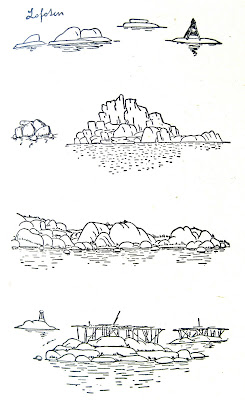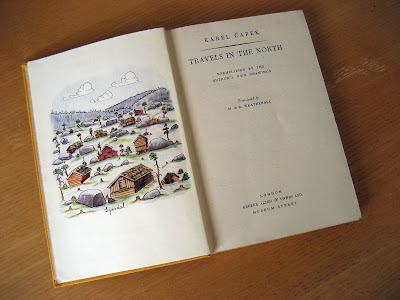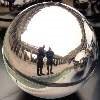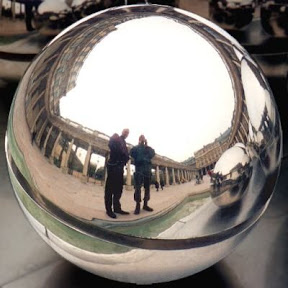Sounds a bit like a radio quiz teaser, but - what could possibly link our forthcoming trip to north Norway with science fiction writing, Janacek's operas, the fight against fascism, pen & ink drawings, and a recent play about newts on Radio 4?
Well, even Google doesn't seem to be able to get you anywhere near a meaningful answer, even though I have been quite generous with the key words in the pragraph above (try it). And that is quite reassuring really, since it would seem to indicate that so-called "intelligent" search engines cannot get anywhere near emulating the processes of the human brain or capturing even the basics of "western" culture (which is something the aforementioned newts could do). Of course, now that I have written this piece (and it has been indexed by the search engines), the mystery of these unexpected connections will no longer exist, but thanks only to human intervention.
 The answer is actually alluded to in an earlier post on this blog - Karel Čapek. He is one of those people who suddenly pop into your consciousness from several directions at the same time, even though you were previously never aware of them as an individual. Čapek (pronounced "chopek") was a Czech writer who is probably best known for coining (inventing, even) the word "robot" in his 1920 play "R.U.R. (Rossum's Universal Robots)". I was aware of the Czech origins of "robot" since childhood exposure to numerous UK and US sci-fi novels (my Mum always had stacks of these paperbacks for us to read during the school holidays), but had never heard of Čapek, and certainly never realised his connections with other aspects of my life. But that all changed when we decided to go to Norway in August 2001.
The answer is actually alluded to in an earlier post on this blog - Karel Čapek. He is one of those people who suddenly pop into your consciousness from several directions at the same time, even though you were previously never aware of them as an individual. Čapek (pronounced "chopek") was a Czech writer who is probably best known for coining (inventing, even) the word "robot" in his 1920 play "R.U.R. (Rossum's Universal Robots)". I was aware of the Czech origins of "robot" since childhood exposure to numerous UK and US sci-fi novels (my Mum always had stacks of these paperbacks for us to read during the school holidays), but had never heard of Čapek, and certainly never realised his connections with other aspects of my life. But that all changed when we decided to go to Norway in August 2001.
One Sunday, a few weeks before going away, we were browsing around in a cluttered second hand bookshop in Greenwich. Looking along the travel shelves we were debating whether or not to buy an old Baedeker's guide to Norway (period travel books can be a good way to get a different angle on travel destinations) when I came across an intruiging yellow bound volume entitled "Travels in The North" by Karel Čapek. 'This looks promising' I thought. And I was right. Because this book had taken nearly 60 years to find me, and it was exactly what I was looking for. It was a travelogue written in the 1930s about a trip (taken some years earlier) through Denmark, Norway and Sweden. Written in an endearingly frank and reflective but humourous central European style it also incorporates many brilliant and idiosyncratic pen & ink drawings by the author. It is the sort of book that you could never imagine throwing away.
 Čapek's book is not exactly a literary masterpiece, but it is charming in every positive sense of the word. The pages are stuffed full of illustrations, at least one every other page, which make it rewarding to flick though as well as read. They are mostly simple pen & ink, highly stylised and reminiscient of traditional Czech woodcuts and the newspaper cartoons that Janacek loved so much. It was the perfect companion to our trip, and will be so again when we pick-up Čapek's trail north of the Actic Circle in a few days time.
Čapek's book is not exactly a literary masterpiece, but it is charming in every positive sense of the word. The pages are stuffed full of illustrations, at least one every other page, which make it rewarding to flick though as well as read. They are mostly simple pen & ink, highly stylised and reminiscient of traditional Czech woodcuts and the newspaper cartoons that Janacek loved so much. It was the perfect companion to our trip, and will be so again when we pick-up Čapek's trail north of the Actic Circle in a few days time.
Having bought the book (for all of four pounds), I decided to find out more about Karel Čapek. The robot connection immediately struck a chord, as I have already described. Numerous SciFi authors have acknowleged this, and it has also seeped into popular culture (according to Wikipedia, Dr Who, Batman and Futurama have all paid hommage to Čapek in relation to robot characters). Then I discovered that it was Čapek who had written the 1922 play "Věc Makropulos" ("The Makropulos Affair", which might also be classed as a scifi story), which Czech composer Leos Janacek used for his celebrated opera of the same name. I am a big fan of all of Janacek's music, and although I am not usually keen on opera, Janacek's are among the few operas that I do like. I was fascinited to discover this unexpected connection. I was also pleased to learn that Čapek was a passional anti-fascist and had a close friendship with the first Czech president Tomáš Masaryk. This position is exemplified in his celebrated 1936 play "The War with the Newts", which has a poingnant relevance to issues of economic migration today - clearly evident in a 2005 BBC Radio 3 production that was recently re-broadcast on Radio 4 (and it was listening to that play that got me thinking about writing this piece).
 Originally published in Czech under the title "Cesta na sever" in 1936, my copy of "Travels in The North" is a 1942 reprint of the fourth "cheap" edition of the English translation by M. & R. Weatherall published by George Allen & Unwin. The fact that it proudly proclaims that it is printed on "War Economy Standard" paper only seems to add to the appeal (the quality of the paper is acually pretty good - not too different from todays recycled paper it has yellowed a bit but is not at all brittle, even after more than 60 years). There is also a single colour plate fronticepiece (a drawing of a boulder-strewn settlement entitled "Ljusdal") bound opposite the title page.
Originally published in Czech under the title "Cesta na sever" in 1936, my copy of "Travels in The North" is a 1942 reprint of the fourth "cheap" edition of the English translation by M. & R. Weatherall published by George Allen & Unwin. The fact that it proudly proclaims that it is printed on "War Economy Standard" paper only seems to add to the appeal (the quality of the paper is acually pretty good - not too different from todays recycled paper it has yellowed a bit but is not at all brittle, even after more than 60 years). There is also a single colour plate fronticepiece (a drawing of a boulder-strewn settlement entitled "Ljusdal") bound opposite the title page.
You won't find this book in Waterstones or Borders - as far as I am aware it has been out of print for over 50 years. Occasionally there are copies available on Amazon's marketplace (and maybe ebay too). Or, just maybe, like me, it will find you in a secondhand bookshop just as you are about to embark upon your own travels in The North.
Well, even Google doesn't seem to be able to get you anywhere near a meaningful answer, even though I have been quite generous with the key words in the pragraph above (try it). And that is quite reassuring really, since it would seem to indicate that so-called "intelligent" search engines cannot get anywhere near emulating the processes of the human brain or capturing even the basics of "western" culture (which is something the aforementioned newts could do). Of course, now that I have written this piece (and it has been indexed by the search engines), the mystery of these unexpected connections will no longer exist, but thanks only to human intervention.
 The answer is actually alluded to in an earlier post on this blog - Karel Čapek. He is one of those people who suddenly pop into your consciousness from several directions at the same time, even though you were previously never aware of them as an individual. Čapek (pronounced "chopek") was a Czech writer who is probably best known for coining (inventing, even) the word "robot" in his 1920 play "R.U.R. (Rossum's Universal Robots)". I was aware of the Czech origins of "robot" since childhood exposure to numerous UK and US sci-fi novels (my Mum always had stacks of these paperbacks for us to read during the school holidays), but had never heard of Čapek, and certainly never realised his connections with other aspects of my life. But that all changed when we decided to go to Norway in August 2001.
The answer is actually alluded to in an earlier post on this blog - Karel Čapek. He is one of those people who suddenly pop into your consciousness from several directions at the same time, even though you were previously never aware of them as an individual. Čapek (pronounced "chopek") was a Czech writer who is probably best known for coining (inventing, even) the word "robot" in his 1920 play "R.U.R. (Rossum's Universal Robots)". I was aware of the Czech origins of "robot" since childhood exposure to numerous UK and US sci-fi novels (my Mum always had stacks of these paperbacks for us to read during the school holidays), but had never heard of Čapek, and certainly never realised his connections with other aspects of my life. But that all changed when we decided to go to Norway in August 2001.One Sunday, a few weeks before going away, we were browsing around in a cluttered second hand bookshop in Greenwich. Looking along the travel shelves we were debating whether or not to buy an old Baedeker's guide to Norway (period travel books can be a good way to get a different angle on travel destinations) when I came across an intruiging yellow bound volume entitled "Travels in The North" by Karel Čapek. 'This looks promising' I thought. And I was right. Because this book had taken nearly 60 years to find me, and it was exactly what I was looking for. It was a travelogue written in the 1930s about a trip (taken some years earlier) through Denmark, Norway and Sweden. Written in an endearingly frank and reflective but humourous central European style it also incorporates many brilliant and idiosyncratic pen & ink drawings by the author. It is the sort of book that you could never imagine throwing away.
 Čapek's book is not exactly a literary masterpiece, but it is charming in every positive sense of the word. The pages are stuffed full of illustrations, at least one every other page, which make it rewarding to flick though as well as read. They are mostly simple pen & ink, highly stylised and reminiscient of traditional Czech woodcuts and the newspaper cartoons that Janacek loved so much. It was the perfect companion to our trip, and will be so again when we pick-up Čapek's trail north of the Actic Circle in a few days time.
Čapek's book is not exactly a literary masterpiece, but it is charming in every positive sense of the word. The pages are stuffed full of illustrations, at least one every other page, which make it rewarding to flick though as well as read. They are mostly simple pen & ink, highly stylised and reminiscient of traditional Czech woodcuts and the newspaper cartoons that Janacek loved so much. It was the perfect companion to our trip, and will be so again when we pick-up Čapek's trail north of the Actic Circle in a few days time.Having bought the book (for all of four pounds), I decided to find out more about Karel Čapek. The robot connection immediately struck a chord, as I have already described. Numerous SciFi authors have acknowleged this, and it has also seeped into popular culture (according to Wikipedia, Dr Who, Batman and Futurama have all paid hommage to Čapek in relation to robot characters). Then I discovered that it was Čapek who had written the 1922 play "Věc Makropulos" ("The Makropulos Affair", which might also be classed as a scifi story), which Czech composer Leos Janacek used for his celebrated opera of the same name. I am a big fan of all of Janacek's music, and although I am not usually keen on opera, Janacek's are among the few operas that I do like. I was fascinited to discover this unexpected connection. I was also pleased to learn that Čapek was a passional anti-fascist and had a close friendship with the first Czech president Tomáš Masaryk. This position is exemplified in his celebrated 1936 play "The War with the Newts", which has a poingnant relevance to issues of economic migration today - clearly evident in a 2005 BBC Radio 3 production that was recently re-broadcast on Radio 4 (and it was listening to that play that got me thinking about writing this piece).
 Originally published in Czech under the title "Cesta na sever" in 1936, my copy of "Travels in The North" is a 1942 reprint of the fourth "cheap" edition of the English translation by M. & R. Weatherall published by George Allen & Unwin. The fact that it proudly proclaims that it is printed on "War Economy Standard" paper only seems to add to the appeal (the quality of the paper is acually pretty good - not too different from todays recycled paper it has yellowed a bit but is not at all brittle, even after more than 60 years). There is also a single colour plate fronticepiece (a drawing of a boulder-strewn settlement entitled "Ljusdal") bound opposite the title page.
Originally published in Czech under the title "Cesta na sever" in 1936, my copy of "Travels in The North" is a 1942 reprint of the fourth "cheap" edition of the English translation by M. & R. Weatherall published by George Allen & Unwin. The fact that it proudly proclaims that it is printed on "War Economy Standard" paper only seems to add to the appeal (the quality of the paper is acually pretty good - not too different from todays recycled paper it has yellowed a bit but is not at all brittle, even after more than 60 years). There is also a single colour plate fronticepiece (a drawing of a boulder-strewn settlement entitled "Ljusdal") bound opposite the title page.You won't find this book in Waterstones or Borders - as far as I am aware it has been out of print for over 50 years. Occasionally there are copies available on Amazon's marketplace (and maybe ebay too). Or, just maybe, like me, it will find you in a secondhand bookshop just as you are about to embark upon your own travels in The North.


No comments:
Post a Comment